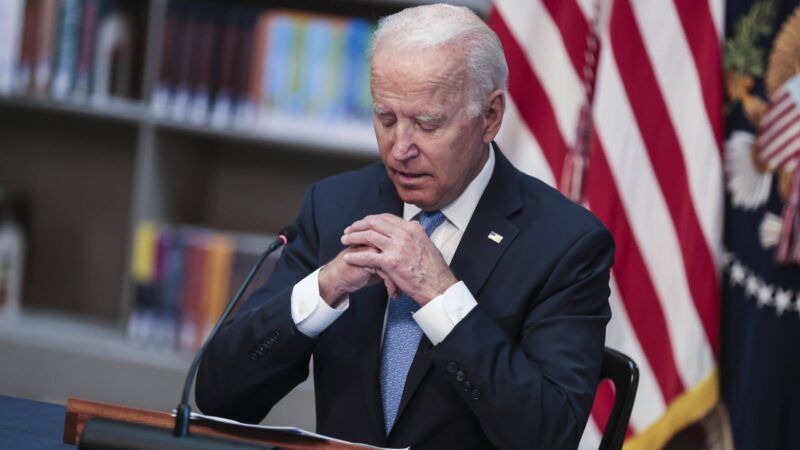Biden's Inflation Scapegoat Is 'Profiteering'
Profligate government spending supposedly has nothing to do with it.

When July's all-item Consumer Price Index (CPI) registered 5.4 percent year-over-year growth—a level of inflation which essentially takes away a year's income growth for low-wage earners—it was all but assured that the White House would offer comment, if not action. President Joe Biden was quick to call attention to accelerating meat prices and, looking for someone to blame, called out the country's three largest meatpackers for "profiteering."
Shortly after that, with August's CPI showing "just" 5.3 percent annualized growth, the president focused his ire on gasoline prices and again suggested that all was not well. Again, profiteering was the scapegoat: "There's lots of evidence that gas prices should be going down—but they haven't. We're taking a close look at that." Maybe he should look inside the halls of the West Wing.
Did profiteering emerge as a meaningful, if not typical, market behavior just as Biden was running for and winning the presidency? Before gasoline and meat, the culprits were private firms operating federal prisons. Before that, it was drug manufacturers profiteering on pandemic sufferers. Are we beset by profit-hungry capitalists who are showing no mercy? Have businesses' motivations suddenly taken a turn for the worst?
There are multiple meaningful answers to these questions, but one thing is certain: Rising inflation means rising prices, and rising prices early in the inflation cycle generally mean rising profits.
When more money is printed and placed in consumer checking accounts, called stimulus or by some other name, spending rises. Sellers sense the increased pace of business, raise prices to balance their supply with growing demand, and book profits based on their historic operating costs. Eventually, costs catch up and the bonanza ends, but early inflation leads generally to some surging profits.
Perhaps there is some bad business behavior out there, but the source of the problem is inflation. And the source of inflation is—you guessed it—the federal government and its proclivity toward financing its spending with the power of the printing press.
None other than one of the world's most noted economists (and generally a source of inspiration for liberal politicians), John Maynard Keynes, first described this inflation-profiteering-government finger-pointing activity in his 1923 book, A Tract on Monetary Reform. Keynes had far more inflation to worry about than we have today. World War I had so disrupted economies in England, France, and the United States (just to name three countries) that the price level had more than doubled between 1914 and 1918. And then there was defeated, reparations-plagued Germany, where runaway inflation caused the value of the Deutsche Mark to practically disappear along with the German economy.
Keynes carefully documented the relationship I just described: Governments print money, inflation surges, profits head skyward, and the world points a shaking finger at business leaders. Yes, Keynes used Biden's favorite word, profiteering, but he went on to bemoan how the blame game caused the public to lose deserved respect for the many business leaders who make markets work for all participants.
Keynes described the besieged business leaders as "now to suffer sidelong glances, to feel himself suspected and attacked, the victim of unjust and injurious laws—to become, and know himself half-guilty, a profiteer."
Mostly because of inflation.
Biden and his key economic advisors are certainly aware that inflation can be a cruel tax that erodes a weekly paycheck's purchasing power just as surely as would higher taxes. The administration's $3.5 trillion spending package is now being pushed partly using the argument that some key provisions will work to reduce lost purchasing power by offering more meaningful federal support for child care, health care, and improved public transportation.
But the administration should also be aware that calling for more spending to calm inflation is like pouring gasoline on an already smoldering fire. Pointing fingers at business leaders and calling them profiteers is music to some people's ears, but it distracts us from the real source of the problem, and that's too much printing-press money.


Show Comments (146)